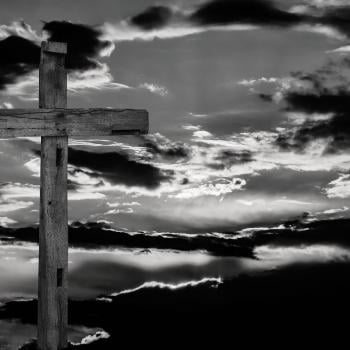Shinto, for example, gets treated as if it is this weird aberration and this strange local custom, and the Japanese themselves do not understand nor define Shinto as a "religion" in the way that Buddhism and Christianity are; and yet, there are more people who are active practitioners of Shinto than there are Jews, and probably modern Pagans worldwide, combined! Though Shinto never had the creedal development that these other religions did, or the scriptural primacy that many have adopted, nonetheless it is a religion based in practice, and in the human experience of nature and of humanity as a part of nature. But, because of the excesses of State Shinto in World War II, and the Christian insistence on suppression of indigenous beliefs that are polytheist or animist in orientation, there is a kind of embarrassment I've observed in some Japanese people about Shinto, and in some Japanese writers on Shinto, because it seems so "strange" in comparison to Christianity.
Some Shinto kami started out as Christian saints, and were simply absorbed into the religion when Christianity first came in contact with Japan; and while I'm sure the Japanese thought this was wonderful, the Christians were not pleased at all! And yet, the resemblances of Shinto to many forms of ancient European Paganism are striking, not only in theology but in practice: the importance of the sounds of certain words for the effectiveness of prayers and ritual, the use of sound and chanting as a transmission of power or as vehicles for the divine powers to employ, ancestor veneration and divine rulers (as well as hero-cultus of sorts in terms of many important individuals becoming enshrined kami after death), and even the timing and significance of some of the festivals (e.g., Setsubun and Imbolc both at the beginning of February, and the similarities of Imbolc to the Roman Lupercalia further, and the importance of purification in all of these festivals), are astounding. Theurgists and Shinto practitioners would get along very well, I'm sure, and some modern ones do exactly that!
Monistic understandings within polytheism, I think, are somewhat inevitable, and though I don't have much attraction to them personally, at least they tend to remain fairly peaceful toward other approaches. Monotheism, however, is another animal altogether. When monotheism remains henotheistic, which is to say, if it maintains that there is only one god for a particular people, or that one may devote oneself to one god exclusively without getting involved too much (or even at all) with others, it can remain relatively safe and easy in terms of "playing well with others."
Unfortunately, the two dominant monotheisms of our day do not do that, and have a vested interest in propagating themselves to the exclusion of all other viewpoints. I like what Reza Aslan, the Iranian-American Muslim scholar said about this in the preface to No god but God: "the great thing about polytheism is that there are many gods, and thus of necessity many ways to worship the many gods, whereas with monotheism, since there is only one god and one truth, therefore there is only one proper and right way to honor that god in most understandings of it."
So, the proliferation of Christian sects is not really a flowering of diversity so much as hundreds of little insistences that these various "one ways" are the "only right way," and many of the denominations in question—from Roman Catholicism all the way to Mormonism, at least on the official doctrinal levels—still believe that they are the one and only way by which salvation in an afterlife is possible, for all people in every worldwide culture, forever! Some religious studies scholars have attempted to argue that there have been monotheists and atheists in every religion since time immemorial; and while I think that may be true for atheism—there have always been skeptics, but even they often take part in public ceremonies and rituals simply for their communal benefits—I don't think that monotheism as a totalizing and singular belief in one and only one god has ever been common until Christianity came along. There would have been monism, there certainly was henotheism; there were (and are) many systems that have an overarching creator god, but that god "retires" and can now only be reached through various lower, but still powerful, intermediaries, as is the case with many Afro-Diasporic religions today; and, there may have been somewhat obsessive devotion on the part of some people to a single god in a variety of cultural contexts. But, none of these are the same thing as monotheism.
Monotheists very carefully select their evidence from these different phenomena, interpret them in a biased fashion, and then claim that they have a long-standing heritage. How limiting and bland, this insistence on one god and only one way to that god! I sometimes feel sorry for people like that, who are so insistent on having the world exactly as they think it should be, or as they think it has been revealed by a text—usually translated, edited, redacted, and interpreted variously over millennia by different communities in far-off places—which is the inerrant and eternal word of the god.





